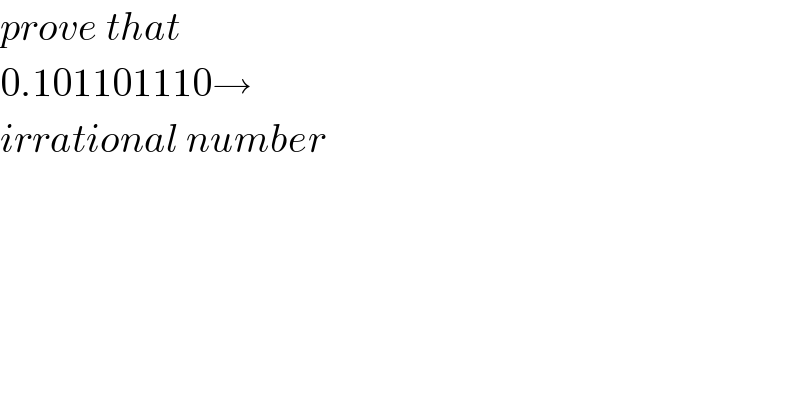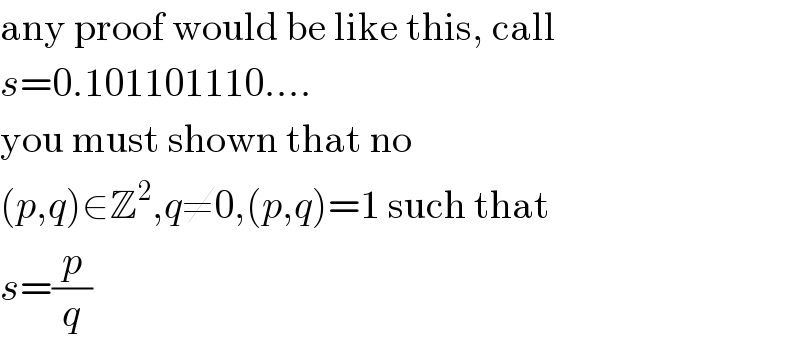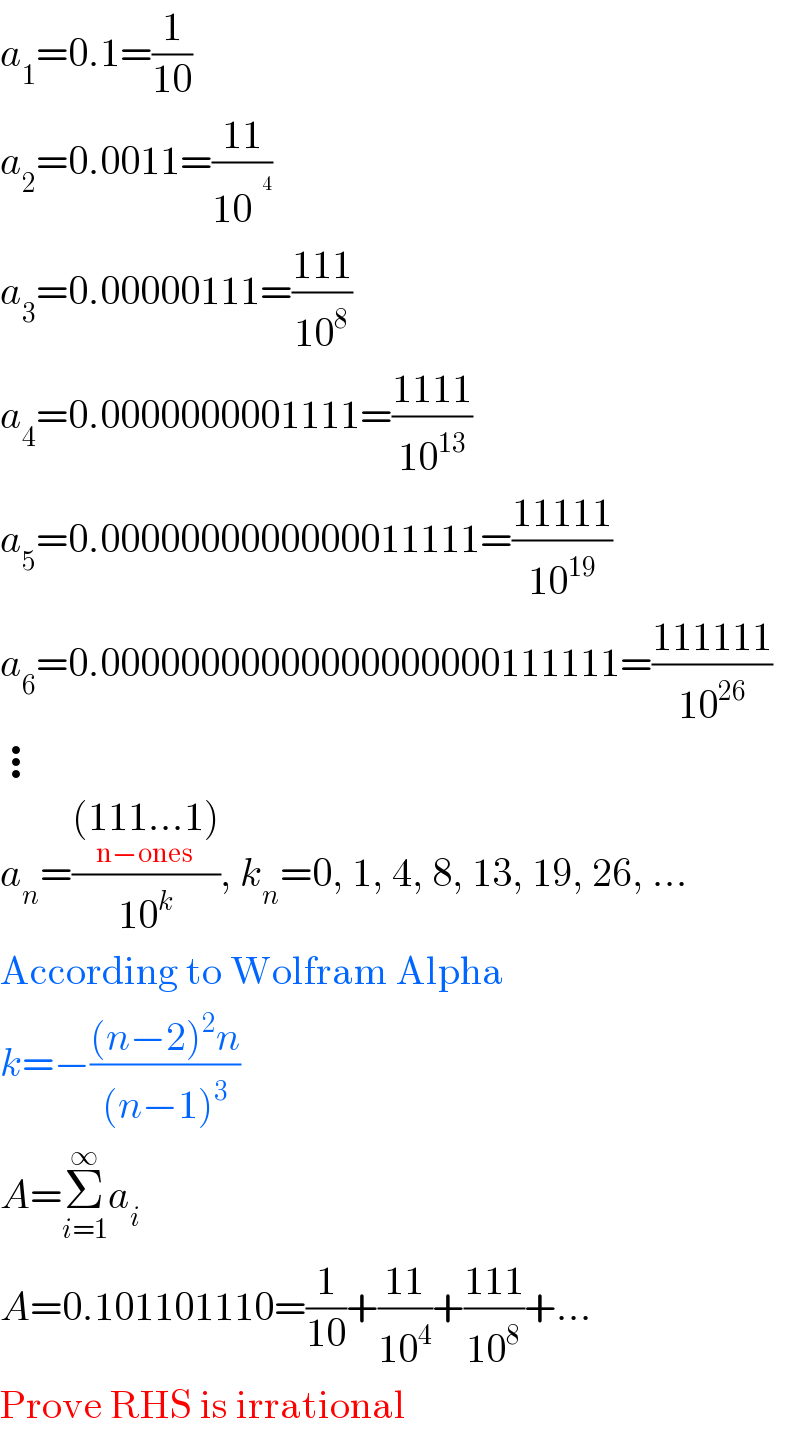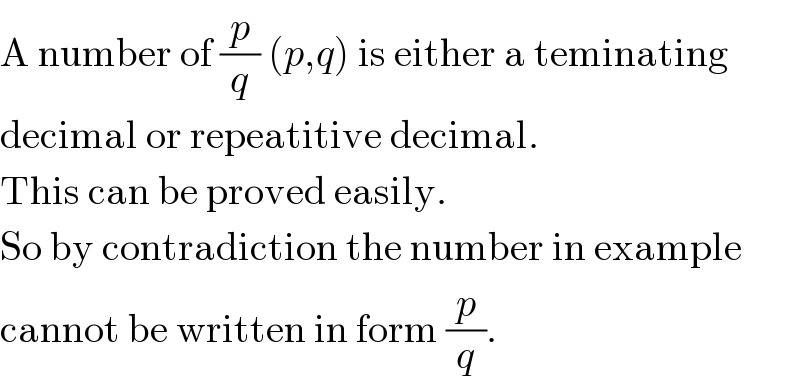Question Number 4670 by malwaan last updated on 20/Feb/16

$${prove}\:{that} \\ $$$$\mathrm{0}.\mathrm{101101110}\rightarrow\: \\ $$$${irrational}\:{number} \\ $$
Commented by prakash jain last updated on 21/Feb/16

$$\mathrm{Non}−\mathrm{recurring}\:\mathrm{non}−\mathrm{terminating}\:\mathrm{decimals} \\ $$$$\mathrm{are}\:\mathrm{irrational}. \\ $$
Commented by malwaan last updated on 21/Feb/16

$${Is}\:{there}\:{mathematical}\:{prove}? \\ $$
Commented by 123456 last updated on 21/Feb/16

$$\mathrm{any}\:\mathrm{proof}\:\mathrm{would}\:\mathrm{be}\:\mathrm{like}\:\mathrm{this},\:\mathrm{call} \\ $$$${s}=\mathrm{0}.\mathrm{101101110}…. \\ $$$$\mathrm{you}\:\mathrm{must}\:\mathrm{shown}\:\mathrm{that}\:\mathrm{no} \\ $$$$\left({p},{q}\right)\in\mathbb{Z}^{\mathrm{2}} ,{q}\neq\mathrm{0},\left({p},{q}\right)=\mathrm{1}\:\mathrm{such}\:\mathrm{that} \\ $$$${s}=\frac{{p}}{{q}} \\ $$
Commented by FilupSmith last updated on 22/Feb/16

$${a}_{\mathrm{1}} =\mathrm{0}.\mathrm{1}=\frac{\mathrm{1}}{\mathrm{10}} \\ $$$${a}_{\mathrm{2}} =\mathrm{0}.\mathrm{0011}=\frac{\mathrm{11}}{\mathrm{10}^{} } \\ $$$${a}_{\mathrm{3}} =\mathrm{0}.\mathrm{00000111}=\frac{\mathrm{111}}{\mathrm{10}^{\mathrm{8}} } \\ $$$${a}_{\mathrm{4}} =\mathrm{0}.\mathrm{0000000001111}=\frac{\mathrm{1111}}{\mathrm{10}^{\mathrm{13}} } \\ $$$${a}_{\mathrm{5}} =\mathrm{0}.\mathrm{0000000000000011111}=\frac{\mathrm{11111}}{\mathrm{10}^{\mathrm{19}} } \\ $$$${a}_{\mathrm{6}} =\mathrm{0}.\mathrm{00000000000000000000111111}=\frac{\mathrm{111111}}{\mathrm{10}^{\mathrm{26}} } \\ $$$$\vdots \\ $$$${a}_{{n}} =\frac{\left(\underset{\mathrm{n}−\mathrm{ones}} {\mathrm{111}…\mathrm{1}}\right)}{\mathrm{10}^{{k}} },\:{k}_{{n}} =\mathrm{0},\:\mathrm{1},\:\mathrm{4},\:\mathrm{8},\:\mathrm{13},\:\mathrm{19},\:\mathrm{26},\:… \\ $$$$\mathrm{According}\:\mathrm{to}\:\mathrm{Wolfram}\:\mathrm{Alpha} \\ $$$${k}=−\frac{\left({n}−\mathrm{2}\right)^{\mathrm{2}} {n}}{\left({n}−\mathrm{1}\right)^{\mathrm{3}} } \\ $$$${A}=\underset{{i}=\mathrm{1}} {\overset{\infty} {\sum}}{a}_{{i}} \\ $$$${A}=\mathrm{0}.\mathrm{101101110}=\frac{\mathrm{1}}{\mathrm{10}}+\frac{\mathrm{11}}{\mathrm{10}^{\mathrm{4}} }+\frac{\mathrm{111}}{\mathrm{10}^{\mathrm{8}} }+… \\ $$$$\mathrm{Prove}\:\mathrm{RHS}\:\mathrm{is}\:\mathrm{irrational} \\ $$
Commented by prakash jain last updated on 22/Feb/16

$$\mathrm{A}\:\mathrm{number}\:\mathrm{of}\:\frac{{p}}{{q}}\:\left({p},{q}\right)\:\mathrm{is}\:\mathrm{either}\:\mathrm{a}\:\mathrm{teminating} \\ $$$$\mathrm{decimal}\:\mathrm{or}\:\mathrm{repeatitive}\:\mathrm{decimal}. \\ $$$$\mathrm{This}\:\mathrm{can}\:\mathrm{be}\:\mathrm{proved}\:\mathrm{easily}. \\ $$$$\mathrm{So}\:\mathrm{by}\:\mathrm{contradiction}\:\mathrm{the}\:\mathrm{number}\:\mathrm{in}\:\mathrm{example} \\ $$$$\mathrm{cannot}\:\mathrm{be}\:\mathrm{written}\:\mathrm{in}\:\mathrm{form}\:\frac{{p}}{{q}}. \\ $$
